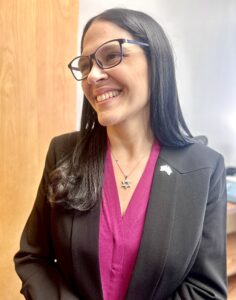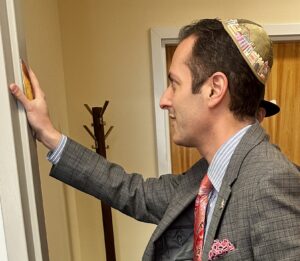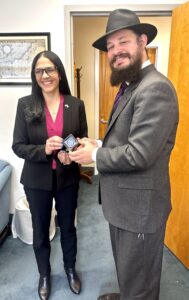
Anat Sultan-Dadon, Israel’s Consul General for the Southeastern United States, in Frankfort Thursday, March 16, 2023
(Photo by Andrew Adler)

Kentucky Representative Daniel Grossberg (D-30) affixes a mezuzah to the doorpost of his Capitol Annex Office in Frankfort, Thursday, March 16, 2023
(Photo by Andrew Adler)
By Andrew Adler
Community Editor
FRANKFORT – You know it’s not a typical mezuzah hanging when you’re the sole Jewish member of the Kentucky House of Representatives, and your featured guest is Israel’s Consul General to the Southeastern United States.
Yet here was Representative Daniel Grossberg (D-30, encompassing part of Louisville) – kippah on his head, blessing on his lips – affixing an olivewood mezuzah to the doorpost of his office in the Capitol Annex. Looking on was Consul General Anat Sultan-Dadon, who was in through Frankfort as part of a multi-state tour marking Israel’s upcoming 75th birthday.
Grossberg, not quite three months into his first term as a Representative, had just dashed across the capitol grounds from the House Chamber to his new digs on the Annex’s fourth floor. And since it’s always good to have a Rabbi on hand for such ceremonies, Rabbi Shlomo Litvin was there to present Grossberg with a banana-sized mezuzah and provide a dose of spiritual context.
(Technically speaking, a mezuzah isn’t the decorative exterior case, but a slip of parchment inscribed with several verses from the Torah, principally the Shema, that is tucked inside)
“I’ll have you explain the mezuzah that was selected and why it was selected,” Grossberg said to Litvin, glancing at the small gathering of people present, “and let’s see if you can be as impactful as you were yesterday and bring tears to their eyes like you brought to mine.”
“So I went through a couple of Judaica options with Daniel,” Litvin recalled, “and the one we finally chose was made by an artist in Israel. And it’s made from olivewood. Olives are one of the Seven Fruits of Ertez Israel” – the land of Israel. And when an olive is crushed, the resulting oil, its “essence,” remains.
The resulting olivewood mezuzah touches on multiples themes,” Litvin said. “Number One, to have something that grew in Israel to now be on the wall” next to Grossberg, who is “someone who recognizes his roots are in Israel and is growing here in Frankfort.”
Additionally, “to have the idea that even when the day gets difficult, even when you feel crushed by everything around you, it doesn’t change who you are. It just brings out your essence – because you’re an olive, and that’s how you’re grown.”
Litvin having delivered the appropriate metaphor, it was time for Grossberg to offer the requisite blessing: “Baruch Ata Adonai, Eloheinu Melech Ha’Olam Asher Kidishanu B’Mitzvotav V’Tzivanu Likbo’a Mezuzah” – (“Blessed are You, Lord our God, Ruler of the universe, who has sanctified us with God’s commandments and commanded us to affix a mezuzah.”)
Accompanied by a chorus of “Amens,” Grossberg pressed the mezuzah against his office doorpost, leaning into the task with just a hint of hesitancy. “You’re not going to hurt it,” Litvin promised.
Amen to that.
Earlier that day – much earlier, in fact – Sultan-Do was a guest of the Kentucky Jewish Council at the 55th Governor’s Prayer Breakfast, held this year at nearby Kentucky State University.
Politics, at least the contentious sort, were decidedly deemphasized. “These are celebrations,” she said of her Israel-at-75 tour of regional statehouses. “They are bipartisan. There was a bipartisan resolution celebrating relations with Israel. And I think that’s a reflection of the really broad support.”
With only two Jewish members of the General Assembly and miniscule numbers of Jews outside Louisville and Lexington, longtime beliefs can be tricky to negotiate. For that reason alone, “it’s on all of us to bring the message of who we are,” Sultan

Israel Consul General Anat Sultan-Dadon and Rabbi Shlomo Litvin in Frankfort Thursday, March 16, 2023 (Photo by Andrew Adler)
-Dadon said. “Even with one Jewish Representative – in some states, we don’t have any – even one or two can make a difference in just sharing what the Jewish people, our values and traditions are about, and what the state of Israel is about.”
Having said all that, Sultan-Dadon emphasized that examples of ignorance, or worse, must be countered swiftly and unmistakably. Told of an incident in February of last year, when a Kentucky legislator used the phrase “Jew them down” during a committee hearing, she touched upon the harsh realities of her mission.
“Unfortunately, we are seeing a very concerning rise in expressions of antisemitism,” she acknowledged. “And I think in the instances you mentioned, what was important to see were the condemnations of that. It needs to be exposed and it needs to be addressed and it needs to be condemned, so that people do not perceive the climate to be one that legitimizes antisemitism.”
There are instances of tangible, significant progress, Sultan-Dadon observed.
“I’m glad to see Kentucky actually leading the way,” she said. “Kentucky was the first state in the United States to adopt the IHRA (International Holocaust Remembrance Alliance) working definition of antisemitism. That is of incredible importance, because if you don’t know what antisemitism is and what falls under antisemitism, you can’t really begin to address it. And in that regard, Kentucky took a very, very important step.”



